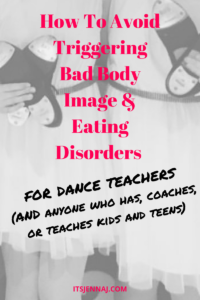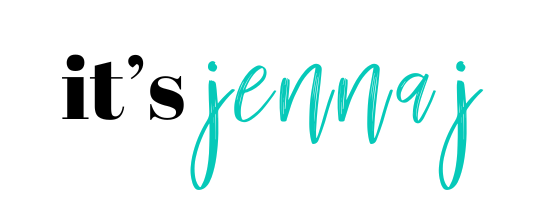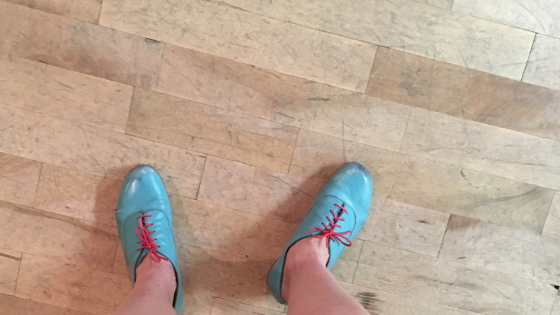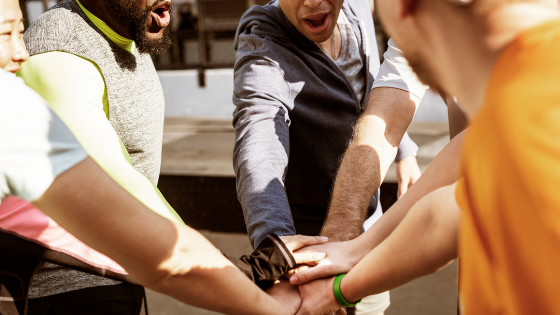How To Avoid Triggering Bad Body Image & Eating Disorders
A few weeks ago, Weight Watchers announced that it would be offering free memberships to teens in a new program they are launching this summer. As someone who not only works with teenagers, but was also once a teen struggling with eating disorders and terrible body image, I have a BIG problem with this. Lots of others do too. Just search for the hashtag #wakeupweightwatchers, and you will see hundreds of people sharing their stories about WW. It’s can be slippery slope into disordered eating for people of all ages, but especially for young women.
This internet uprising got me thinking about my role as an educator, and how the things we do and say as adults can really make or break the way our kids grow up. Even though I don’t have kids of my own, I often refer to my dance students as “my kids”. During busy weeks at the studio, many of them probably spend more quality time with me than they do their parents. While I write this from the perspective of a dance teacher, these ideas could applied to all sorts of situations where adults are working with and influencing kids and teenagers. That includes family members, coaches, teachers, etc.
While following this #wakeupweightwatchers hashtag for a couple of weeks, I read so many horror stories from people whose parents put them on diets at a very young age. This got my thinking about the pressure to diet in the dance world. It inspired me to reach out to my friends and followers in the dance community, and pose the question:
Did you ever have a dance teacher (or any adult in your life) say or do anything that totally killed your body image or even contributed to an eating disorder?
What I found out was astounding. I was apparently one of the lucky few. Colleagues of mine were told that they were “too fat” to make it as a dancer all the time, especially as they were going through puberty. They were told to lose weight because they wouldn’t be hirable or castable. One was weighed by her dance teachers regularly, and told (with no guidance as to how): “Weigh 5 lbs less next time.” Another was ridiculed in front of classmates, by teachers who passive-aggressively asked her if she liked food, then told her she “Looked like she did.” The worst was a teacher who inappropriately touched my friend’s thighs and told her she needed to “get rid of some of this extracurricular activity”.
The outcome of this treatment? ALL of these women went on to develop eating disorders.
Some still struggle to this day. Some of them went on to lose weight and became professional dancers. Others lost weight, gained it all back, and STILL went on to dance professionally in spite of it. The most heartbreaking was the one who never even tried to audition after college. Her teachers convinced her that she’d never make it, because of her size. Another, playing devils advocate, told me that she wishes she would have had Weight Watchers, because at least then she would have eaten SOMETHING instead of starving herself. “Weight Watchers: Better Than Anorexia” Doesn’t sounds like a very compelling sales pitch to me. I have a sneaking suspicion that, like many others, WW would have been the gateway drug to anorexia for her anyway. Her dance teachers had already planted the seed.
Thing that was the most mind blowing to me, is that in most cases, nobody ever knew that these young women were suffering.
Why? Because most of them were within a “normal BMI range” (whatever that even means anymore), and looked the part of “fit” and “healthy”. What a dancer “should” look like. There was always the shame element too. Nobody wanted to admit that they were being body shamed. They were complimented for losing weight, and praised for how “good” they looked. I fell into the same category for most of my life too. Except the difference for me was this: I never experienced any of this sort of extreme fat shaming from my family or my dance teachers. My mom never took me to Weight Watchers with her. My teachers never commented negatively about my weight. Even when I was in college, and had to get my body composition tested to get into the dance major, nothing was ever done with that number except to give me an “FYI”.
In spite of this, I still wound up with major body image issues.
For me, it didn’t take one big traumatizing moment to trigger me. It was all the subtle little messages I was receiving on a daily basis that ultimately led me down a road of disordered eating, quantifying my food, compulsive exercising, and terrible body image. Once I became aware of that, I couldn’t un-see it. In fact, I see it all the time now, and can’t help but wonder how these subtle triggers are affecting the way other kids and teenagers feel about themselves. These days, I don’t think there are as many dance teachers out there who can get away with saying the things that were said when I was growing up.
While most of us would never dream of putting our students (or our own kids) through any sort of intentional body shaming, we need to be aware of the subconscious messages we send–not only through what we do and say, but also what we don’t.
I’m not innocent here, either. I’m sure that I’ve unintentionally sent some harmful messages to my students in the past by doing some of these things. Many times, we have the best intentions in mind: we want to set our kids up for success and protect them from ridicule. In spite of this, our actions can often have the opposite effect. Here is a list of things that I’ve found triggering for myself in the past, that could potentially be harmful to young dancers’ body image. AND some ideas for how we can do better as teachers, coaches, and parents.

Trigger
Complimenting them on their apparent weight loss.
Instead Try
Complimenting them on their skill. Their technique or intelligence. Their stage presence. Literally anything else.
Trigger
Calling certain kids things like “skinny mini” or other nicknames related to their body shape and size.
Instead Try
Calling them whatever they like to be called–they’ll usually let you know. Greet them by name when you see them and ask them how they’re doing.
Trigger
Criticizing your own body in front of them.
Instead Try
Speaking kindly of yourself in front of them. Or just shift the focus from yourself altogether.
Trigger
Talking about your diet in front of them. Also talking about any sort of restrictive food plan you’re on that you think is “not a diet”. (It’s basically still a diet.)
Instead try
Talking about your other personal growth efforts in front of them. Like the great book you just read or the workshop you’re excited about attending this summer.
Trigger
Not eating certain foods in front of them because you’re “eating clean”.
Instead try
Letting them see you eat vegetables. Also let them see you eat pizza.
Trigger
Moralizing food–calling certain foods “good” and “bad”
Instead try
Letting them discover for themselves how certain foods make them feel when they dance. Get curious about their food choices. “That looks really good! What is it?”
Trigger
Giving them detailed nutrition advice. If you’re not also a dietician, it’s not really within your scope of practice.
Instead Try
Having some referrals to give them, should they ask for nutrition advice. A registered dietician (preferably one with a non-diet or Health At Every Size approach, or experience working with athletes and eating disorders) can be a great resource.
Trigger
Calling out their measurements or commenting on them when you measure for costumes.
Instead Try
Distracting them with other conversation while you’re measuring. Write the numbers down without letting them see everyone else’s.
Trigger
Drawing attention to the size of their costumes when you try them on. Or making a big deal when they don’t fit.
Instead try
Passing them out without calling out sizes. Speak neutrally about options for exchanges and alterations.
Trigger
Forcing them to wear unnecessarily revealing costumes and class attire without considering their comfort (and age!).
Instead Try
Requiring whatever dress code might be needed to teach proper technique. I’m all for leotards and tights, but not every kid might feel comfortable in a mandatory crop top.
Trigger
Talking about another student’s (or anyone’s) weight loss or gain in front of them.
Instead Try
Avoiding talking about others behind their back. It’s just not nice.
Trigger
Posting your before/after shots on social media, especially if your students follow you. Chances are, your “before” looks like someone else’s “right now”.
Instead try
Posting body positive messages on your social media. Or if that’s honestly not your style, post pictures of your cute dog and videos of your latest choreography. Or don’t let your students follow you on social media at all.
Trigger
Having magazines or books in the studio that could trigger diet mentality. (like most women’s magazines and that infamous “Diet For Dancers” book that basically taught my entire college class how to starve ourselves.)
Instead Try
Putting out books and magazines that showcase dancers of all shapes, sizes, abilities, races, etc. Aim for resources that educate and inspire.
Trigger
Consistently only casting very thin dancers in featured parts.
Instead Try
Rewarding the best dancers regardless of their size. The ones with the best work ethic, attitude, technique, stage presence, etc.
Trigger
Focusing all your attention on your star student.
Instead try
Giving some form of praise AND some constructive criticism to every student in each class.
Trigger
Talking about things like getting a “bikini body” or burning off calories when doing conditioning exercises. (AND allowing students to talk about these things in your class.)
Instead Try
Talking about how these exercises will help them become stronger dancers. AND redirecting the conversation when other students try to go there.
Trigger
Cueing core engagement in a way that makes kids self conscious. “Suck in your gut!” just feels icky.
Instead try
Explaining your students how to engage their core and find good placement. Then pick a neutral cue word to remind them. Mine is “water drain!”. Don’t ask. It works!
Trigger
Letting dancers with traditional “dance bodies” dominate all the dance history lessons.
Instead try
Sharing inspiring stories and youtube videos of a variety of different types of dancers–they are out there! #dancerscomeinallsizes
Trigger
Constantly criticizing their weaknesses, especially those appearance related ones that they have little control over.
Instead Try
Teaching them to play up their strengths and work with what they CAN control. Like being reliable, coachable, smart, musical, and friendly.
Trigger
Telling them that maintaining a specific body shape and size is the ONLY way to be a dancer.
Instead Try
Teaching them to be resilient and how to deal with rejection. While thin dancers may have it easier, NOBODY is immune to criticism and rejection in this industry.
trigger
Making them dance long hours without acknowledging that they are athletes who may need to refuel.
Instead Try
Scheduling a short break, and encouraging them to bring a snack. Have some shareable snacks on hand just in case someone hasn’t eaten all day. (Inevitably there will always be someone.)
You may look at this list and think that it’s not realistic to avoid all these triggers.
It’s kind of true. But that doesn’t mean we shouldn’t try. The dance world is vicious. Actually the whole world is, when it comes to beauty standards. And if you want to be a professional dancer, there ARE specific aesthetic standards that you need to meet if you want to get hired into certain companies. At least right now. But we CAN create the kind of world that we want to live and dance in. There ARE already growing opportunities for diverse types of dancers. It’s certainly better than it was when I was younger. I’d also like to point out an unfortunate truth, because I know somebody is going to say it:
If making sure that all of your students (regardless of their genetics) get into a professional ballet company at all costs is your goal, then right now, that goal is probably not compatible with anything I just said.
That’s the unfortunate truth. My goal is to give the kids I work with the kind of technical training they’d need to pursue a career in dance if they so choose. AND to give them the life skills that they’ll someday use to be a functioning adult, regardless of who they grow up to be.
Dieting has no place in helping young people become happy, healthy humans.
Some people are naturally suited to the long, lean, aesthetic of ballet. Others might do better with more athletic styles like contemporary or hip hop. Or tap, where the focus is more about how it sounds than how it looks. Or maybe even a different activity altogether! And even though I’m a personal trainer, I don’t think you can force anyone to drastically change their natural body type without extreme measures. Thinner doesn’t not always=healthier. But with the right guidance, we CAN help our “kids” become the best, strongest, healthiest, versions of themselves. We’re the ones who are supposed to inspire them to go on and pursue their dreams–whether that’s performing brain surgery or performing onstage. If we’re shaming them for how they look, nobody wins. At worst–they’ll interrupt or even end their lives with an eating disorder. At best, they’ll never reach their full potential because they’re too busy counting points, to focus on becoming who they are truly meant to be.
The last week in February is National Eating Disorders Awareness Week.
I hope that this post helps inspire you to do an even better job of being aware of the subtle ways that eating disorders can be triggered, especially in the kids and teens that we care about. If you find yourself guilty of any of the things I listed, don’t beat yourself up. We all do it. And will probably continue to slip up from time to time. It’s hard not to when we work and play in a world that’s so focused on body and appearance. I’m sure that you have even more ideas, based on your experience and story. If you do, I’d love to hear! Please share them below in the comments.








A certain professor in college once told me. “You’re such a beautiful dancer…if only you lost a little bit of weight.” This conversation happened when I was the best in shape I had ever been in. On my way home from class I stopped for taco bell. Lol
Ughhhh Stefanie! Why do they think they’re helping when they say that stuff? I’m so sorry you had to deal with that. It’s amazing to me that so many of us were dealing with this and we all just walked around like everything was fine.